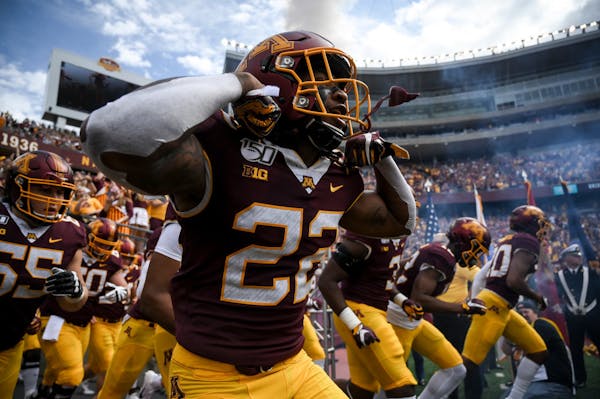 See
more of the story
See
more of the story
The Gophers football team allowed 49 points on Saturday night. If Michigan's kicker had been accurate, that total could have been as high as 57.
The Gophers defense was expected to decline after losing Antoine Winfield Jr., Kamal Martin, Carter Coughlin and Chris Williamson to the NFL, but abject failure in the opener dulls hope that the 2020 Gophers can capitalize on their historic 2019 season.
It's one thing to lose a good player. That's the nature of the sport.
It's another to lose an eraser.
Antoine Winfield was an eraser.
Winfield quickly won a starting job with Tampa Bay, and could be on his way to playing in a Super Bowl as a rookie.
He wasn't merely an exceptional player for the Gophers. He was a last line of defense capable of helping with the first line of defense.
Winfield's explosive athletic ability, combined with his studiousness, allowed him to make plays from the line of scrimmage to the back of the end zone. He created turnovers, discouraged deep passes, broke up passes, intimidated receivers running across the middle and filled holes in the running game. He possessed excellent ball and return skills, so if he did intercept a pass he was capable of making a game-changing play.
Everything Winfield did for the 2019 Gophers was sorely missing against Michigan. On Friday night, the Gophers will play at Maryland against an offense far less likely to expose their weaknesses, but if the 2020 Gophers are to build on what they accomplished in 2019, they'll need to lessen the impact of Winfield's absence.
"When you're looking at how we run our program, we're a developmental program and we had four guys drafted off the defensive side of the ball last year, and we have a lot of new faces on that side,'' Gophers coach P.J. Fleck said. "Not just replacing the draft picks but also the guys behind the guys that played.
"There are a lot of question marks on defense. We have very talented football players, just need experience to get better and better."
Winfield is emblematic of Fleck's "developmental program." He, like Martin and Coughlin, was recruited by Jerry Kill and Tracy Claeys. This is the first season in which Fleck has had to rely mostly on his own recruits, and specifically the class he had to patch together quickly after being hired at Minnesota.
Fleck already has made good on many of his promises at Minnesota. But there is a difference between building one exceptional season and winning every year, and that difference might be manifested in the recruitment of defensive players.
Fleck has established his offensive bona fides. He recruited Tanner Morgan, Rashod Bateman and Mo Ibrahim, and seems to have depth and promise at every offensive skill position.
Every Minnesota coaching staff seems to have a positional weakness. Glen Mason was exceptional at finding running back and offensive line talent but his defenses often lagged. Kill and Claeys excelled at finding defensive backs but struggled to build a passing game. Tim Brewster accumulated physical talent but didn't know how to coach it.
From this point forward, Fleck can be judged as a coach of his own recruits. If the Michigan game was an accurate indication, he might not want to be judged on his defensive players for another season or two.
"I don't like the result, I don't like all the rushing yards," Fleck said, "but this is a step by step process.
"… The tackling has to improve and will improve. We'll get better.
"… Everything we're talking about starts with me. I make the decisions on who plays and where we're headed as a program. Guys need to be able to mature pretty quickly when they're in there, and we will."
That theory might not be tested against a woeful Maryland offense, but it will be tested at some point over the next two months.
Jim Souhan's podcast can be heard at TalkNorth.com. On Twitter: @SouhanStrib. jsouhan@startribune.com





